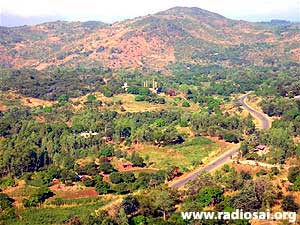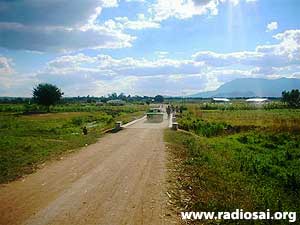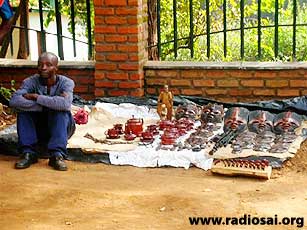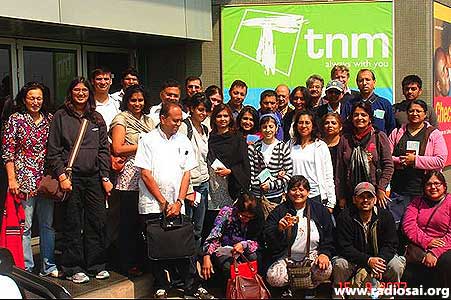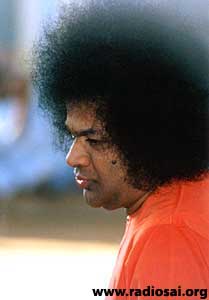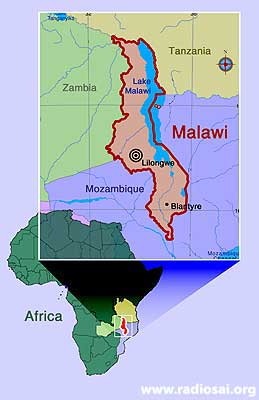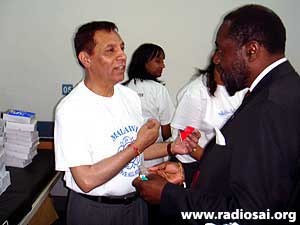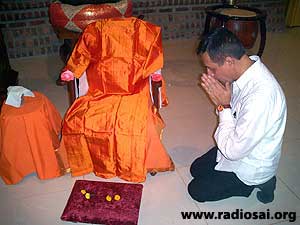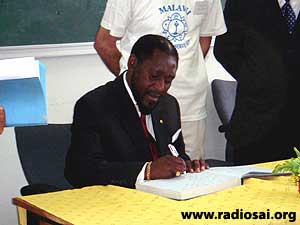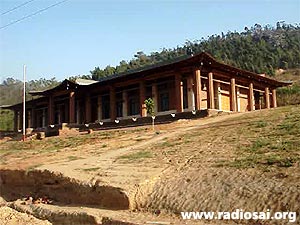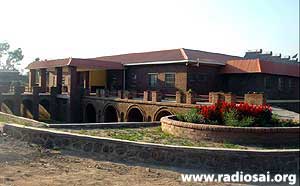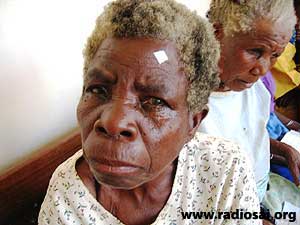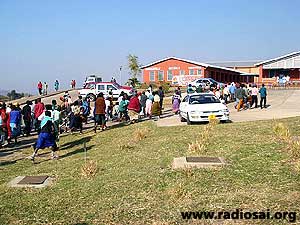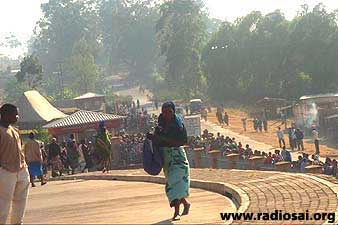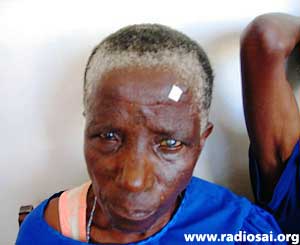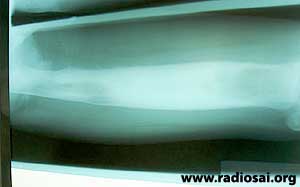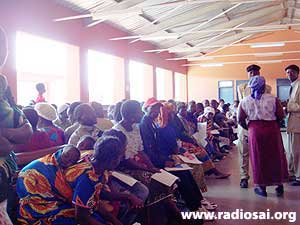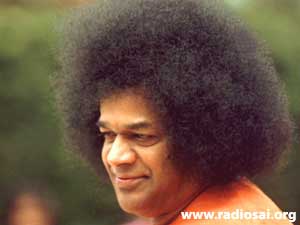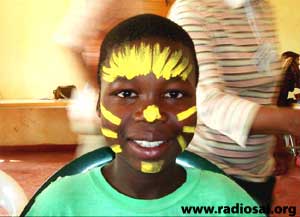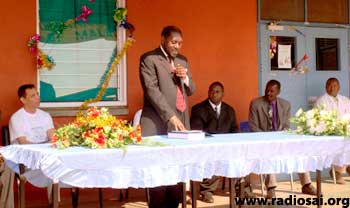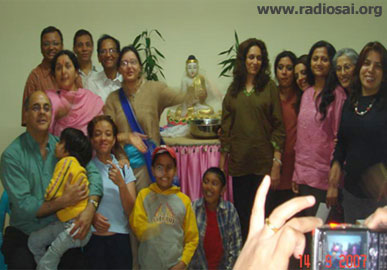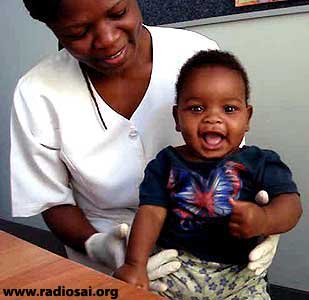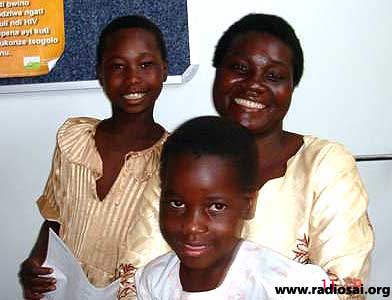 |
 |
 |
Volume
5 - Issue 11
NOVEMBER 2007 |
Even as world bodies and international aid agencies debate policies and budgets, for many in Malawi, the name of Bhagavan Baba stands for selfless service and divine compassion that comes to their doorstep. They know Him as someone who sends His angels to infuse hope in their lives and relieve them of their agony.
Maintaining His outward distance from the drama of humanity’s foibles where some nations are reeling from the giddying heights of wealth and prosperity while others are sadly languishing in disease, ignorance and poverty, Bhagavan Baba continues to silently propel His devotees in every nook and cranny of the globe to live in His image, as exemplars of His message, practicing love, sacrifice and purity, just as He has for the past eight decades. His divine gaze misses no detail of suffering and pain and His compassion reaches out to millions around the globe, right where they live, be it in Fiji or Africa , Latin America or the Middle-East. Sai Movement in Malawi – Small yet Solid The story of the Sai movement in Malawi is a story of the power of pure intent and its potency to make a discernible difference. The Sai movement in Malawi consists of a small, yet strong and committed group of men and women, a group that has come under Sri Sathya Sai’s spiritual guidance. Inspired by His teachings and driven by a desire to translate them into action, they have surged ahead to deliver the desperately needed services in local communities, in the form of medical care, completely free of cost and without any hidden agendas.
Malawi – Attractive and Agonising
Located in Eastern Africa, Malawi is among the most beautiful countries of the continent. Popularly known as the ‘Warm Heart of Africa’, it is surrounded by Mozambique, Zambia, Zimbabwe and Tanzania. Lake Malawi, formerly Lake Nyasa, occupies most of the country's eastern border. The north-south Rift Valley is flanked by mountain ranges and high plateau areas. It is a place of great scenic beauty. Lilongwe is the capital of Malawi and Blantyre is the commercial capital. Most Malawians rely on subsistence farming, but the food supply situation is precarious and the country is prone to natural disasters of both extremes - from drought to heavy rainfalls - putting it in constant need of thousands of tonnes of food aid every year. More than half the population lives below the poverty line.
Tens of thousands of Malawians die of AIDS every year. Malawi is rated as one of the poorest countries in the world. There are good hospitals in the country but they face an acute shortage of doctors of various specialization. Medical equipment and supplies are also in short supply. Against such a dismal background, for several years now, the Sai Organization of Malawi has been playing a pivotal role in bringing medical relief to the local population and much of its success is due to the strong support it has enjoyed from the Sri Sathya Sai Baba Service Organization of the United Kingdom. As you read further, you will see how Bhagavan Baba, the single unifying force, is binding varied groups of inspired individuals from different continents, to make the earth a better place for all of us. The Sai Organisation in Malawi Blossoms The Sri Sathya Sai Service Organization of Malawi is relatively young as it was formally formed in 2001. Prior to this, since 1980 devotees used to get together every Thursday and hold bhajans at each other’s homes. Later on, the spiritual sessions began to be conducted at the Hindu temple. Study circles were also held and a review and discussion of Bhagavan Baba’s gospel inspired the group to translate His divine words into action by engaging in service activities. In a country that is one of the world’s HIV hotbeds with high AIDS infection rates, the need for providing medical care, comfort and aid was paramount. The Journey of a Thousand Miles Begins with a Single Step With the help of the Malawi Blood Transfusion Centre (MBTS), the Sai group started organizing regular blood donation camps which were held every three months. In 2002, the MBTS was a newly incorporated agency in Malawi. Funded by the European Union, it is the first one of its kind in Malawi. It provides blood testing and other blood-related services. Thanks to the dedication, devotion and sense of discipline displayed by the band of Sai volunteers, the blood camps held by the Sai Service Organization have now become a regular project. Various hospitals rely on them for a consistent and dependable supply of blood. Group members are also listed on an emergency data base. Gaining confidence and experience from the highly successful blood donation camps, the Sai Organization inched further to serve at local hospitals by providing nutritious food for the patients. Serving God in the Ailing
The typical diet of the Malawians is UFA, which is white maize flour cooked like a paste called ‘Nsima’. This thick starchy porridge made from corn or cassava is accompanied by some curry or relish. From a nutritionist’s point of view, this food is low in calcium, nutrition, iron and vitamins content. Hence malnutrition among patients is an added concern. The paediatric ward, of the Queen Elizabeth Hospital – the largest Government-run hospital which was in dire straits, was chosen for service on the last Saturday of every month. Serving hands-on, the volunteers noticed the disturbing lack of hygiene in the wards which was further aggravating the condition of the patients with already depressed immune systems. In some facilities, the absence of even the basic medical supplies and equipment led to severe complications that could have easily been avoided. The painful scenario of deprivation, disease and poor medical conditions led the Sai group to explore an option where they could provide top class medical services to the Malawians in a controlled environment, with adequate medical supplies and equipment and a reduced risk of infections caused by poor hygiene. His Love in Flow - Easter 2004 Marks First Medical Camp
In April 2004, the Sai Organisation of Malawi urged Dr. Upadhyay from the Sri Sathya Sai Baba Service Organization of the United Kingdom to organize a medical camp by bringing in doctors from various fields of medicine so that the ailing and economically disadvantaged Malawians could benefit. During the holy weekend of Easter 2004, as though to emulate the example of Jesus Christ and His sacrifice, a team of 28 doctors and volunteers came all the way from the United Kingdom and conducted the very first eye-care camp at Chikwawa, south of the city of Blantyre. This was a fantastic camp where more than 5,000 patients were treated for visual impairment. The milestone effort began with a widespread publicity campaign aimed at informing the local population about the camp. Vehicles were sent out into the targeted geographical areas to transport the patients, especially those who were partially or fully blind due to mature cataracts. Designated personnel screened and directed patients to appropriate doctors. Medical treatment was provided by the British team in an organized and efficient manner. Surgeries were performed under sterile conditions. The blessed patients, who were actually seeing the world after long spells in some instances, could not believe their eyes when they were given glasses – both sunglasses for post-cataract surgery care as well as reading glasses, entirely free of cost. An adequate supply of medicines brought all the way from the UK was also given to every patient at no cost. At the end of the 5 days, many wounds and burns were healed. The local people were dancing with joy when after years they could see clearly, thanks to the cataract operations performed by the UK team. Till then, many had resigned to the thought of living the rest of their lives with full or partial visual impairment. ‘Sai Eye Camps’ Pan-Africa – Celebrating Baba’s 80th Birthday Soon, all the Sai Centres in Africa decided to conduct cataract operations to honour Baba’s 80th birthday. Two local eye specialists, Dr. Msukwa and Dr. Kaluwa, who had helped the Sai organization with the camp in 2004, came forward once again to help in this noble cause. From July 2005 to November 2005, five eye camps were held to cover as many southern Malawian areas as possible. About 518 people benefited from this effort. A special case was a man unable to see for 36 years because of a mature cataract, who had his eyesight restored. He could not believe what had happened to him and called it a ‘miracle’. These camps proved to be very successful in all respects. Medical Camp at Chiradzulu Hospital: 9-14 September, 2007 By the beginning of 2007, the Sri Sathya Sai Organization had gathered enough experience, confidence and momentum to aspire for more effective opportunities to serve. They hoped to hold a large medical camp that would deliver relief and treatment to a significant number of suffering Malawians. The challenge was to bring together doctors of international caliber from a variety of specializations along with nurses, pharmacists and volunteers, a sizeable array of medical equipment and medical supplies and dispense pain relief, medical attention, diagnosis, surgeries and end or reduce the suffering of the local population.
In Malawi, the AIDS scourge has cut life expectancy to a shocking 36 years, and an estimated 900,000 people are infected with HIV. According to the Department of Health, 50,000 to 70,000 people die each year from AIDS-related ailments. Sai Medical Volunteers Surging Ahead
Seeking divine guidance from Baba, the devotees once again called upon Dr. Surendra Kumar Upadhyay, of the United Kingdom, to organize a team of doctors for a week long medical camp. Once Dr. Upadhyay’s team committed to travel from the United Kingdom and participate in the medical camp, the Sai Organization of Malawi prepared a public information campaign and spread the word about the camp and its services using print media and radio broadcasts. The need for medical aid was so great that the local population responded with gusto. Over 6,000 patients poured into the week-long camp. Coming from places far and wide, patients sought relief from a variety of ailments including ring worms, viral flu, pneumonia, severe chicken pox, cataracts, cancers, tumors, hearing problems among a fairly young generation, malaria, cerebral malaria, gynaecological problems…you name it and the patients had it. Sadly, every year, about 60,000 AIDS-afflicted children are orphaned in Malawi. Not surprisingly, some conditions among the children were acute and highly disturbing. This included a condition generally observed in abused children and described in medical parlance as ‘frozen watchfulness’. It is characterized by children's facial expressions of never smiling, appearing unhappy or scared.
Given the ghastly drama of life and death that has been played out before their very eyes and the emotional trauma they have suffered due to it, many Malawian children appear to be in the state of ‘frozen watchfulness’ all the time. They have suffered neglect at the hands of an uncaring society and humanity at large that has no time to pause and cast a look of concern at their plight. The vicious cycle of pain, disease, death, illiteracy and extreme poverty has robbed the children of Malawi of any reason to smile. Yet all that changed suddenly when several thousand of them found their way to the Sai medical camp where they were received by the Sai devotees lovingly, into a warm embrace.
The Sri Sathya Sai Baba Service Organization of Malawi held the medical camp at Chiradzulu which is 25 kilometres from the city of Blantyre. It was officially inaugurated by the Honourable Mr. Henry Mussa, the Member of Parliament of Chiradzulu East and also the Minister for Transport in the Government of Malawi. It was served by a team of dedicated, caring and loving medical professionals who included Ophthalmologists, General Practitioners, Paediatricians, General Surgeons, Anaestheticians, ENT surgeons, Pharmacists, a Dental Surgeon, a Microbiologist, a nurse and volunteers who all flew down from United Kingdom to spend days in selfless service with the love of Sai in their hearts. Thirty-six members of the UK team joined hands with the local Sai organization volunteers at the base of the camp held at the Chiradzulu District Hospital. The whole team was housed at Amitofo Care Centre which nearby has a beautiful Buddhist temple in Mapanga. The Amitofo Care Centre has an orphanage that houses children orphaned mainly because of parents who died of AIDS.
Interestingly, the Amitofo Care Centre is funded by the Taiwanese Government. Malawi is one of only six African countries to maintain diplomatic ties with Taiwan rather than China. In an effort to help rein in the AIDS epidemic in its African ally Malawi, Taiwan has offered free anti-retroviral therapy to benefit over 1200 Malawians living with HIV to date. Since 1998, Taiwan has helped set up a hospital in Mzuzu in northern Malawi, the main stopover town in the north of the African country of 12 million people. In June 2006, the Department of Health (DOH) also established a clinic in the Mzuzu Central Hospital and started delivering free anti-retroviral drugs (ARVs) to Malawians afflicted by HIV. Since these mobile clinics are already in the north of Malawi, the Sai Organization decided to concentrate its efforts in the southern part of Malawi where the need is the greatest. Care for Children Comes First
The Sai Medical camp started on September 9 at Amitifo Care Centre where the orphans were checked by the team of doctors. There are 218 children in this orphanage with children ranging from 2 ½ years to 15 years of age. The group held Thursday prayers at Amitofo Buddhist temple, joined by the orphans who started the session with Buddhist chantings, followed by Sai bhajans. The whole atmosphere had beautiful vibrations and it felt simply divine to all present. The name of the one God was chanted in different languages, through the medium of various faiths, in the true spirit of the Sai organization that believes that "There is only one religion, the Religion of Love.” Fifteen nurses were hired from the Nursing School of Malawi to translate all communication between patients and doctors. Every department ran a full day of consultation, diagnostics, surgeries and treatment. Helping Eyes to See Again At the Opthalmology department, Dr. Msukwa and Dr. Upadhyay treated the patients and conducted 41 cataract operations. Everyone received sunglasses, reading glasses and a month’s supply of eye drops and necessary medicines for post-operative care. In total, over 1,000 pairs of reading glasses were distributed during the camp and 250 cases of special made-to-measure glasses were also handed out. The patients were, undoubtedly, happy to receive the glasses and could not believe that they were dispensed for free. They were overwhelmed by the kind of treatment and said they had never seen so much love before. Baba’s compassion and concern touched them all deeply. Some of the older ladies wanted to express their heartfelt thanks to the doctors who performed their cataract operations and restored their vision. When they were all set to leave for their respective villages, they spontaneously broke out into a dance and sang to them out of joy, proving that at times such as these, music and dance express inner joy way louder than even words!
General cases that received attention included instances of viral flu, pneumonia, severe chicken pox, HIV, and a lot of other problems. Medication was given to the patients. There were 15 special cases treated with Thermal Imaging for pain relief during this camp. After Care Support In a touching gesture to provide totally professional and loving care to the patients, a member of the UK medical team, Dr. Dhiru Mistry stayed back after the camp for follow-up cases. Speaking of his experience at the camp he said:
“The camp has been a great success. As per Swami’s personal example, we served the poor and the needy at a level He wants us to do. There are many organizations in the world that are doing great work. What makes us different is that we have been inspired by our Lord to serve with unconditional, non-judgmental love, and not to seek any rewards, remuneration or gratitude for the effort. In the end, serving with such an attitude of humility where we see ourselves as His instruments makes a great difference in the way the service is rendered. Every action, word and motive is filtered through the Sai lens which is all about heartfelt and pure love. I feel so privileged to be associated with Bhagavan Sri Sathya Sai Baba’s mission… He has given us so many quotes, that sound catchy and simple enough to understand, but when one studies the quotes closely, dissects them and reflect on their details, I mean finer details, there is more to it then saying rhyming words such as “Help Ever Hurt Never” or “Love All Serve All” and “Hands That Serve Are Holier Then The Lips That Pray.” “As far as I am concerned I can only make a small contribution, I cannot cure things, but what I can give with His grace is love and support and pray that things improve. It is very sad to see children die in the wards and patients suffering without any counseling.”
The Anxiety of AIDS Describing the typical scenario at the camp, Ms. Jaishri Mistry, another volunteer from the UK, observes: “Throughout the day, patients continued to pour in. One in five women had high blood pressure. Due to widespread AIDS the average life span for men is about 37 years of age. Women are left to look after the children. There are many elderly men and women and hardly any young men. The country teaches and educates everyone on HIV/AIDS and this information is constantly advertised practically everywhere in public places and hospitals. But many people are very ignorant and do not want to have the free test done. Even though, physically the symptoms are all there, i.e. pneumonia, heavy breathing, bones sticking out, loss of weight, etc. You see fear in their faces but you cannot force them to get tested. If detected early, the treatment can be started and they then have a better chance of living and survival rather than ignoring it till it is too late. Many patients are able to lead somewhat normal lives and able to provide for themselves and their children once they are on the medication.” Given the need for creating awareness about the illness and its possible treatment, the camp played a vital role in educating the uninformed Malawians about hope of their survival.
The ENT (Ear, Nose, Throat) department saw cases of ear infections, throat infections, etc. Hearing aids were provided to the patients including younger ones in the age group of 15 to 45 years. Diagnostic procedures such as CT scan, BP scan, x-rays were done in order to arrive at a proper diagnosis. Patients suffering from goitre, cheek cancer, para-pharyngeal abscess, neck lumps, nasal problems, nasal septal deviation were also attended to. Even one case of larynx cancer was seen.
The medical professionals and volunteers in the general surgery division handled 31 operations, mostly hernia related. There was also a case of an acute nasal block which was corrected through surgery. A patient named Agnes Sankhani, had a huge tumour the size of a football, surgically removed from her back. After the three hour long operation, she was absolutely fine. So overjoyed she was with the love and dedication of the doctors and volunteers that she choked as she spoke of her experiences. She had never felt such love and care, she said. Dr. Dhiru Mistry, who stayed back to take care of the follow-up cases removed the stitches from her back. Agnes felt as if an enormous load had been shed off of her back and continues to be greatly relieved by this happy and unforeseen development in her life. Exemplary Care for Children Dr. Nadisha, a paediatrician at the camp observed that there were many cases of infectious acute cerebral malaria. HIV related malnourished children were also treated. Mothers with gynaecological problems sought help in droves and considerable education about nutrition was imparted to the patient population. Some of the other health issues that were addressed at the medical camp include undiagnosed paediatric conditions like Hydrocephalus, TB, congenital heart defects, untreated epilepsy, cerebral palsy, etc.
Most of the common paediatric conditions were treated with the available medication. The pharmacy was quite well-equipped and ran efficiently. High calorie supplements were given freely to children suffering from malnutrition. Another Paediatrician Dr. Nikila Pandya shares an interesting anecdote: “I saw this patient, a young boy and felt he had not just abscesses on his leg but a deep seated infection in the bone. Yet I had to confirm with an x-ray. I wrote a form and sent him for an x-ray before prescribing the treatment. He came back saying the machine was not working. "I was very disappointed because we couldn't start treatment for the problem he was suffering for a long time. The only other option was to refer him to the hospital in Blantyre with a referral letter. I did the same with little hope that this boy will find his way up there. That was the end, I thought. Next morning, during my prayers, I kept thinking of this boy and what would happen to him.....will he go to Blantyre or not?
“Suddenly that afternoon I was busy seeing the patients and had sent another child for x-ray hoping that the machine had been set right and I was still feeling bad for the previous day’s young patient with the leg abscesses. Just then, as I was thinking about him, one of the volunteers enters my room with this boy from the previous day who had been on my mind and in my morning prayers. "He had miraculously come back to see if the machine was working and had the x-ray done and came to see me. We confirmed the diagnosis of bone infection osteomyelitis and started a prolonged course of antibiotics. Someone had heard the silent prayer and answered it for me.....the Lord was listening to my thoughts that morning. He was indeed running the entire camp.” The team handling pathology cases dealt with patients who had undiagnosed diabetes, about 8 cases of bilharzias, one case of bilateral axillary abscesses which was later diagnosed as TB. Palm injuries were drained surgically and diagnosed as possible Staphylococcal infection using a microscope.
Microbiologist Dr. Dev Kothari, recalls how happy and grateful the patients were for receiving such high quality and loving medical services. He says: “What really mattered to them was the explanation for their ailments given lovingly. One lady I remember who had severe infection of the palm after a knife injury, joined her hands (after the surgery) to thank me. But I told her to thank the Lord and not me.” Hundreds of patients had their pus discharging abscesses, injuries including car accidents, burns and other such severe wounds treated and dressed lovingly for the first time in their lives. There was a special case of a lady who came with a match-stick stuck in her ear which was removed with forceps. Then there was another case of Burkitt’s Lymphoma in the eye which had burst and become infected as gas bubbles in the tissue could be seen under the microscope. Swami’s Vibhuti to the Rescue Dr. Hema Patel, from the UK brought a small container of Vibhuti (sacred ash) with her which she used on wounds and burns. Miraculously, she has been using this Vibhuti ever since and it never runs out. It is quarter full all the time. In her experience, the healing for the patients has been tremendous just with healing power of the holy Vibhuti. Relief from Long Standing Dental Traumas The dental team at the camp realized that the local hospital had a very limited teeth extraction facility. The team of Sai volunteer dentists trained the local staff at the hospital how to deal with basic extractions and taught them how to perform procedures such as the root canal, fissure sealants, composites and amalgams. The necessary composite curing light and amalgamators were brought from the UK and left in the hospital for the Department of Dentistry to carry on using them. Also the medical team left behind enough material for over 500 root fillings and possibly up to 1000 composites in the future. There were rampant infections involving Herpes Zoster virus and occasional Kaposi’s Sarcoma. A few fibromas (benign tumours) were excised with the help of the ENT surgeon also. Over 600 extractions were done and over 50 fillings were carried out within the first 5 days.
The dentist from the local Chiradzulu hospital was really grateful for all that he had learnt from the UK doctors and the equipment and materials that he had received to keep for continued use. Educating the local medical teams and volunteers about the latest medical procedures was an added bonus of the camp. Even the dedication and love experienced by the patients and local Malawians had a lasting effect on them. The camp witnessed unparalleled dedication and professionalism from the team of five pharmacists and three assistants who dispensed over 24,000 items of medication to over 6,000 patients within the 5 days of the camp. Most of the medicines used and dispensed during the camp were brought from the UK. Many medicines were donated by local well-wishers. Some medicines were brought from pharmaceutical companies as well. Apart from the doctors from the UK, a local doctor also helped the pharmacy team. Great care was taken to ensure all the dosages were checked properly and interpreters were used to make a patient understand the exact dosage and how to have it. All the patients who came to the camp were fed the local food - UFA, vegetable curry and dal or lentils. On Thursday they were also treated to sweet rice. The post-operated patients were given porridge. The patients were overjoyed when they were served rice which is considered a local delicacy.
The colossal success of this first-of-its kind medical camp was due only because of the divine energy of Bhagavan Baba permeating its every aspect. His presence came through loud and clear in the love and dedication demonstrated by the very sincere doctors as they approached patient after patient smilingly, never running out of patience. Indeed it was their warmth and friendliness for each patient, their genuine sense of concern and the assuring tone of their voice that drew patients in huge numbers every single day. The very fact that they were attended to with such consideration and grace assured them that they were in safe hands. “Everyone was talking with love” - Joseph Judge Phiri Joseph Judge Phiri came to the camp for a general health check up and said, "I can't go to any doctors because I cannot afford them and also I'm not sure whether I will get the right treatment. I heard through word of mouth that in this camp, the patients are served with love, and hence I came to have a check up. I was diagnosed with high blood pressure and blood sugar. The most overwhelming part of the whole camp was the way everyone was talking with love and respect to all the patients. I'm very happy with the service which was rendered here in the camp. The doctors are really nice." As he was saying this, he was choked with emotion and couldn't say anything further. Getting ‘Real’ Medicines Another patient John James Bigula had been complaining of chest pain before he came to the camp. He said, "I'm very happy with the doctor who attended to me. All the villagers of Maltope village in the Chiradzulu district were saying that the doctors are giving 'real' medicines. At that moment of the day, I was worried about my chest pain which was severe. At the camp, the doctor did a thorough check up and found a problem with my leg which I had not disclosed to the doctor. I was impressed with the treatment and also with the diagnosis."
Says Loveness, also a patient who came for treatment, "The whole village was talking about the people who were treated for HIV. The medicines which were given to them were taken by the patients and they are feeling better now. It actually works!" When the patients came for treatment, there was not even a smile on their faces. This is a typical expression of an average Malawian, struggling to get through life, one day at a time. When they were treated by the doctors and were about to leave, they felt so tongue-tied and that they could not express anything by way of words. The experience moved them so deeply that some cried, others thanked the doctors with gestures and the yet others simply broke into a dance to communicate their joy. The children who came to the paediatric ward were kept entertained with face painting and balloons blown to various animal shapes. Toffees and biscuits were also distributed to the young patients. All patients were provided soft drinks and water since they had come from far off places and stood in the queue for a long time, patiently waiting for their turn. Praise from a Malawian Government Representative
Honourable Mr. Henry Mussa, the Member of Parliament of Chiradzulu East and also the Minister for Transport in the Government of Malawi thanked the Sri Sathya Sai Organization profusely for arranging such a generous and caring medical camp. He said, "People of this district are very poor. I thank Sri Sathya Sai Organization for organizing a camp in this area. All the people here need a lot of medical attention." While addressing the crowd, he urged the people to make the best use of the doctors who had come from UK and were distributing free glasses and medicines. The purity of intent and the nobility of the effort at this camp were hard to ignore. Many individuals and groups, regardless of whether they knew who Sri Sathya Sai Baba is, felt drawn to do whatever they could to support the initiative. This included Malawians of various faiths such as Muslims, Christians and Hindus who offered their services at the camp and brought food for the doctors as a spontaneous gesture of their love. It served to unite many divergent groups - the patients, the local politicians, medical practitioners (both British and local), pharmacists, nurses, volunteers and the local population. The medical team that had come all the way from the UK to share their professional expertise and their love for Bhagavan Baba’s teachings, displayed amazing humility by adapting graciously to the local conditions.
The volunteers’ only mantra through the camp was to allow their love for Bhagavan Baba to gush forth in their interactions with each ailing embodiment of His divinity in Malawi. As Dr. Dhiru Mistry rightly pointed out, it is one thing to intellectually process Bhagavan Baba’s catchy teachings such as “Love all, serve all” and quite another to put them into practice. The camp provided all those who served there the rare chance to actually walk the talk, for the love of Sai. Their participation and concern for the plight of Malawians whom the world seems to have forgotten, reminded the team that each person is a cell in the organic body of society. Unless each cell is well, the whole cannot be healthy. If we must live in the awareness of God’s omnipresence in everyone and everything around us, then we cannot conveniently blind ourselves to the pain and sorrow of our fellow beings and limit our vision only towards self-aggrandizement.
The single and most valuable take-away from the experience for all parties concerned was how easily barriers of language, culture and economic status succumb to the power of divine love. Bhagavan Baba’s example and gospel of loving service to fellow beings has repeatedly proven to be the foolproof solution to the deadly threats of disease, greed and hatred facing humanity, our planet and eco-system. Explaining how the power of love is at once so simple and strong, Baba says:
- Heart2Heart Team
We are extremely grateful to Ms Asha Rao, a former student of the Anantapur campus of Bhagavan's University and a committed Sai worker from Malawi, for taking special interest and sending this story and the pictures along with a telling powerpoint presentation.
Dear reader, how did you like the article? Did it inspire you in any way? Would you like more of such Sai Seva stories? Please share your feelings with us at h2h@radiosai.org. |
|||||||||||||||||||||||||||||||||||||||||||||||||||||||||||||||||||||||||||||||||||||||||||||||||||||||||||||||||||||||||||||||||||||
Vol 5 Issue 11 - NOVEMBER 2007
|
Best viewed in Internet Explorer - 1024 x 768 resolution. |

